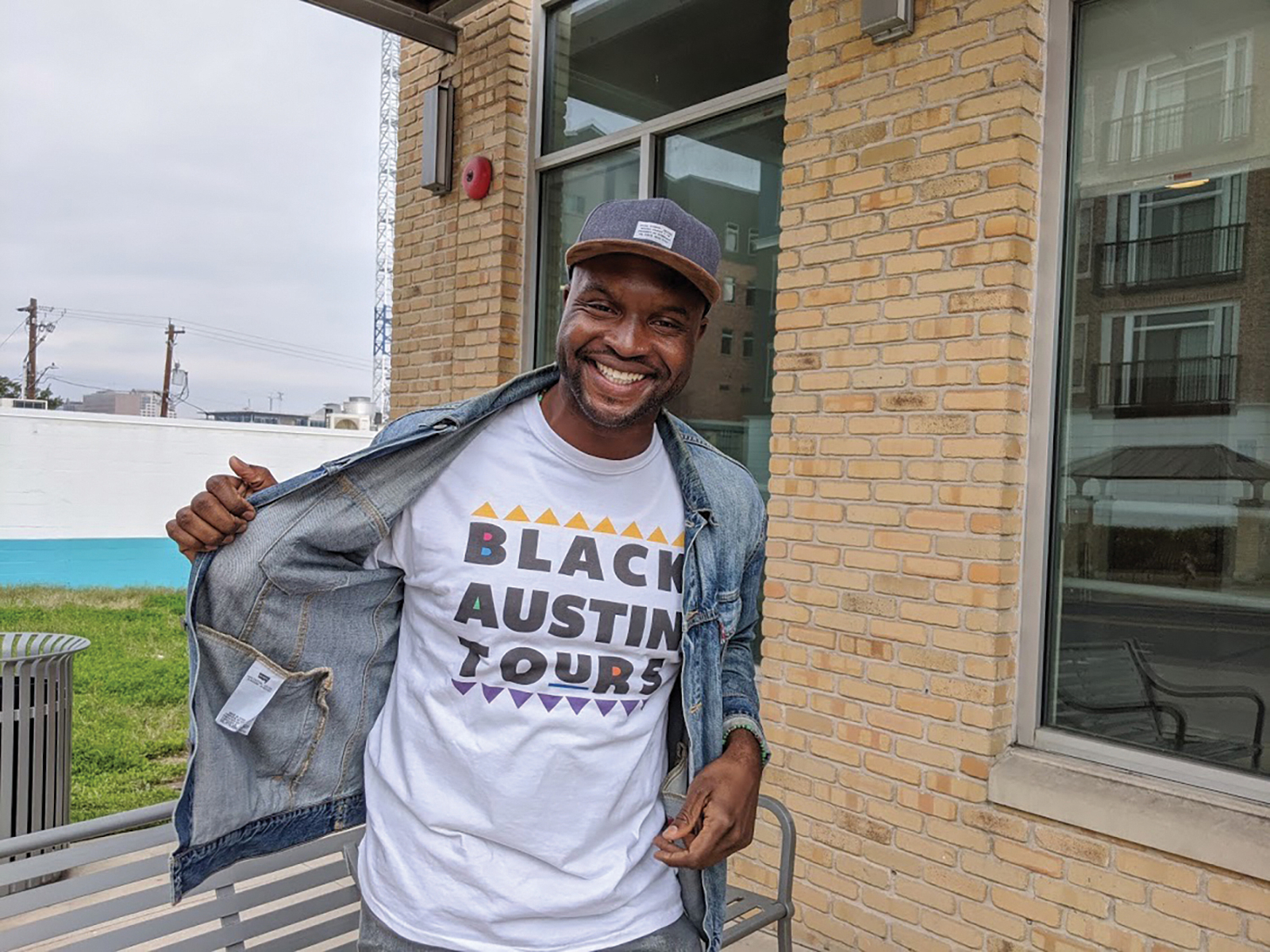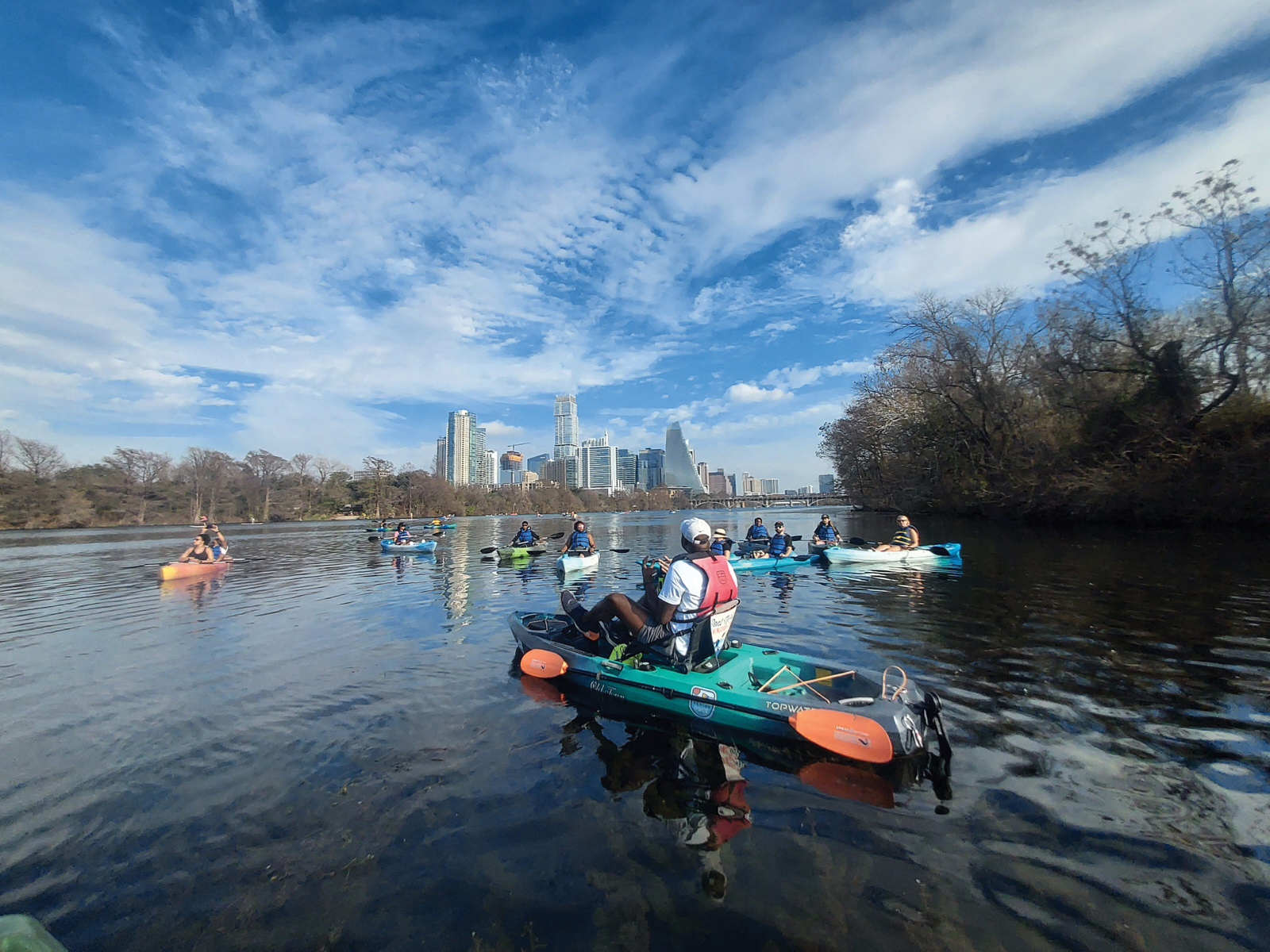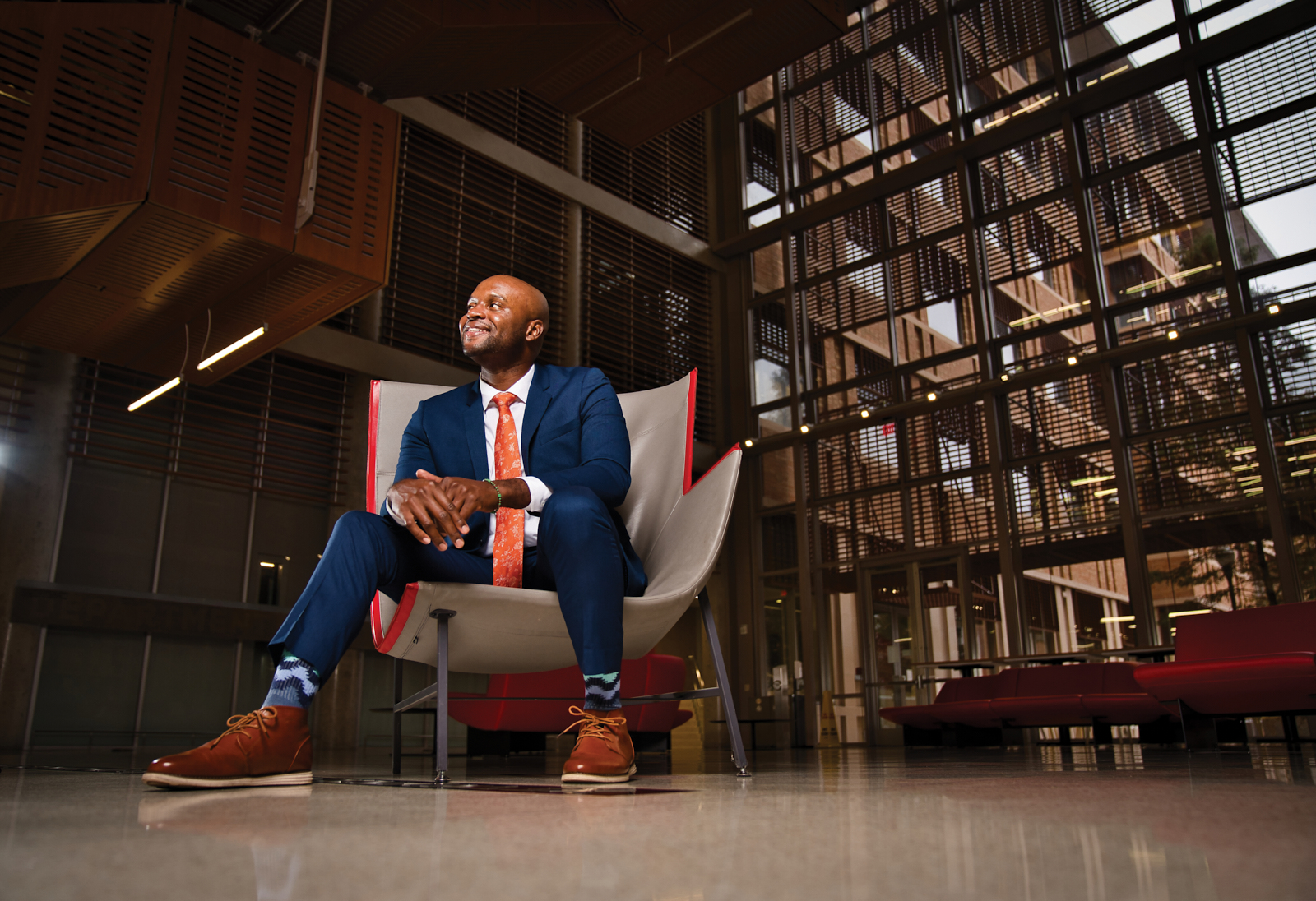A Longhorn Is Using His Gift to Tell the Stories of Black Austinites Left out of History Books

On a brisk Sunday morning this past March, just before 8 a.m., a crowd is huddled around the Texas African American History Memorial outside the Texas Capitol, bouncing on their toes and rubbing their arms to keep warm in the 48-degree weather as they wait for their tour guide.
Javier Wallace walks up, his white T-shirt emblazoned with “Black Austin Tours,” and greets everyone enthusiastically. The group of nine people is pretty representative of his typical tour demographics: a church group of four white women, a Black woman who came by herself, a white UT professor, two friends (one Black and one white), and one white man. Despite the chilly weather and early wake-up time, everyone who signed up for the downtown walking tour has faithfully showed.
Before launching into his own story, Wallace offers his audience the chance to share their own. Two Black women explain they don’t know enough about Austin’s Black history and signed up for the tour to go deeper. One white woman tearfully shares she’s been on a personal journey since the summer of 2020 to better understand her privilege. She adds that her family roots in Austin go back seven generations.
“Mine do, too,” Wallace says. The implications of those three words hang over the group until he adds with a laugh, “You might have more to cry about on this tour.” She laughs with him, ready to face the ugly history of their ancestries.
For the next two and a half hours, he guides the group along a wide loop of downtown, expertly blending personal narrative with extensive historical knowledge.
“Who deserves to be remembered, and how do they deserve to be remembered?” he asks the group as he pauses at historical plaques to reveal names left off and points to buildings that once housed Black businesses and churches.
It’s that question that’s at the center of Black Austin Tours, which Wallace founded in 2019 to shine light on the hidden history of the Black trailblazers, activists, community leaders, and everyday citizens who shaped the city—and state—but are not found on the pages of history books or engraved in the many plaques dotting downtown.
The child of educators, teaching has always come naturally for Wallace. He received his bachelor’s and master’s degrees from Florida A&M University in 2011 and spent several years using his communication and sport management degrees to teach and coach at the elementary school and high school level.

In 2017, he became a student again—this time on the Forty Acres—and in 2021 graduated from UT with a PhD in curriculum and instruction, with a focus on the intersection of race and sport. His dissertation (and upcoming book tentatively of the same title), Sueños del Norte: Black Panamanian Hoop Dreams & the Realities of Basketball Trafficking, was selected as a top topic by Harvard’s Afro-Latin American Research Institute. He developed Austin Black Tours during his time at UT, modeling it after his other tourism ventures, AfroLatinx Travel and BlackPackas.
“I didn’t have money to buy a tour van,” he says. “I didn’t have money to create this big touring business. All I had was my two feet, my knowledge, and my mouth, and the public space is free.”
His walking tours of downtown and East Austin weave through the city’s historic sites, while his Rowing Dock kayaking tour of the Colorado River focuses on Austin’s role in trafficking enslaved people and the swim-ins of the 1960s. His virtual tour encompasses history from the three in-person routes.
The history is sobering, but the tours are grounded in the achievement and resiliency of the Black community, amplifying his message that, “We are not what we have been reduced to.”
For Movetia Salter, an attendee of Wallace’s March tour and the chief human resource officer at the nonprofit SAFE Alliance, the most poignant part of the downtown tour is the ending. Wallace concludes the tour on Sixth Street, once a thriving street of Black commerce. Listening to Wallace, Salter says she no longer saw a strip of bars sticky with alcohol, but a “beautiful pristine space with a trolley, people getting off and on, dressed to the nines.” She imagined people shopping and living with dignity.
That’s the magic of Wallace’s tours; he breathes life into forgotten stories, resurrecting what history suppressed. In Eve Ewing’s Ghosts in the Schoolyard, she compares Chicago’s closed schools to graveyards. Wallace views Austin the same way, a mass cemetery without markers—but he’s committed to documenting each grave, to ensure past and present Black Austinites “be recognized as full Austin-
ites that deserve to be respected, that deserve every opportunity this city claims to offer.”
His personal history with Austin is similarly complicated. His lineage can be traced to Frederick Grimes, who was among the first families to colonize Austin alongside Stephen F. Austin. Wallace’s great-great-great-grandmother, Hannah Grimes, was enslaved by the Grimes family.
His grandfather worked as a janitor at UT and dreamed of seeing his children attend. Wallace’s mother, Kendell Hill Wallace, fulfilled his wish, graduating with a degree in special education in 1980, but did not feel welcomed or accepted as a Black student from a working-class family. For Wallace, choosing to attend the university was a difficult but ultimately redemptive decision.
“[My mom’s experience made it] that much more meaningful to me to have gotten a PhD from UT,” he says. “What she had to emotionally endure on that campus is something that you could never compensate [for]. I feel like it was on me to make good on that, to give her something to be somewhat proud of.” Cognizant of the wounds UT represented in his family, Wallace committed his time there to paving a way for more Black students to follow. He found a supportive community of advisors and peers in the Division of Diversity and Community Engagement and the Heman Sweatt Center for Black Males. Devin Walker, PhD ’18, the DDCE’s director of Global Leadership and Social Impact, studied in the same program as Wallace and often collaborated with him.

Walker says Wallace truly “walks the walk,” pointing to the time he challenged the itinerary of a planned study abroad trip to Costa Rica that the two were helping lead for undergraduate students. Wallace questioned why students wouldn’t be taken to Black neighborhoods and areas and offered his expertise to plan a new itinerary that gave students a richer, more nuanced view of the country. No matter where he goes, that’s what Wallace does: He helps people make sense of the past to better understand the present.
Walker and Wallace have remained partners in rethinking tourism and travel, hosting the podcast Black with Blue Passports to explore traveling while Black and the importance of reclaiming public space.
Currently, Wallace is a race and sport postdoctoral associate at Duke University—but he’s hardly done with Austin. He still offers tours every few months, whenever he’s in town.
“Javier Wallace in a short time is going to be known and respected as the Black public historian of Austin—if not Texas,” Walker says.
CREDITS: Nicole Renfro, Dave Eubanks, Korey Davis





